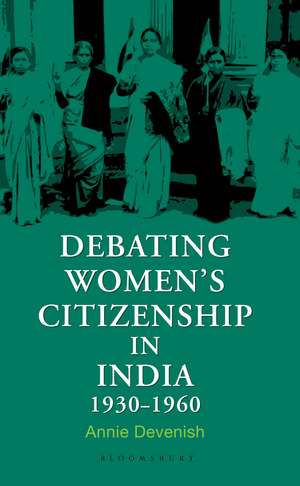Debating Women's Citizenship in India, 1930–1960
Autor Annie Devenishen Limba Engleză Hardback – 27 mai 2019
Preț: 509.12 lei
Preț vechi: 730.44 lei
-30% Nou
Puncte Express: 764
Preț estimativ în valută:
97.42€ • 104.18$ • 81.23£
97.42€ • 104.18$ • 81.23£
Carte disponibilă
Livrare economică 27 martie-10 aprilie
Preluare comenzi: 021 569.72.76
Specificații
ISBN-13: 9789388271943
ISBN-10: 9388271947
Pagini: 288
Dimensiuni: 135 x 216 x 20 mm
Greutate: 0.43 kg
Editura: Bloomsbury Publishing
Colecția Bloomsbury Academic India
Locul publicării:New Delhi, India
ISBN-10: 9388271947
Pagini: 288
Dimensiuni: 135 x 216 x 20 mm
Greutate: 0.43 kg
Editura: Bloomsbury Publishing
Colecția Bloomsbury Academic India
Locul publicării:New Delhi, India
Caracteristici
Provides a critical assessment of the contribution of this generation, documenting both their successes and failures in an effort to begin filling the void in the history of women's collective activism in India between the late 1940s and the 1960s
Notă biografică
Annie Devenish (Researcher, African Ombudsman Research Centre (AORC) School of Law, University of KwaZuluNatal, South Africa) is a South African historian working on the history of feminist politics and organisation in India and South Africa. She is particularly interested in the intersections between gender, development and democracy in the Global South, and identity politics in the context of political transition.
Cuprins
Introduction 1. The Emergence of the Indian Woman as a Political Citizen 2. Constitution Writing and the Sexless Citizen 3. Citizenship through Service 4. The Reluctant Citizen: India's 'Doubtful and Resisting' Women 5. Citizenship through Struggle: The National Federation of Indian Women 6. The Embodied Citizen: Family Planning in Independent India 7. The Indian Woman as a Global Citizen: Vijayalakshmi Pandit, Hansa Mehta and the United Nations Conclusion
Recenzii
In this amazingly comprehensive and confident history of women's enactment of citizenship in the struggle for and experience of Indian national independence, Annie Devenish has provided readers, historians of Indiaand of women alike, with an entirely new investigation of the years of early nationhood and women's role as agents of change.
In this lucid account of the modern Indian women's movement, Annie Devenish invites us to consider the variety of ways that citizenship was conceptualised at the intersection of nationalist and feminist politics at key moments in the history of Indian democracy.
It is a very well-researched book and should be read not only by scholars interested in women's studies but by all students of modern Indian history.
In this lucid account of the modern Indian women's movement, Annie Devenish invites us to consider the variety of ways that citizenship was conceptualised at the intersection of nationalist and feminist politics at key moments in the history of Indian democracy.
It is a very well-researched book and should be read not only by scholars interested in women's studies but by all students of modern Indian history.
